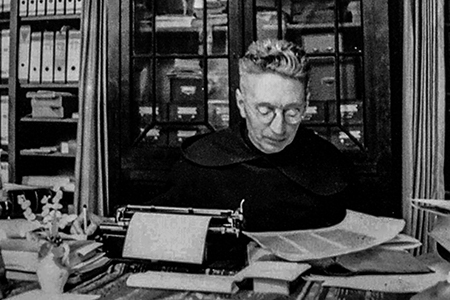 As a University Professor with a specialty in Philosophy, Titus Brandsma would have been acutely aware of the ideas and propaganda circulating in neighboring Germany during the 1930s. The Nazi party promoted a broad spectrum of basic principles which enshrined raw power and violence, especially at the expense of the weak. Friedrich Nietzsche’s celebration of the “superman” glorified the violent exploitation of others as the only path to survival and success. One can only rise to the top of a struggle by stepping on those inferior people below. In such a mindset, Christianity was ridiculed for its care and attention to the poor, sick, elderly, and handicapped. In Brandsma’s own Netherlands, the Dutch Nazi party (the NSB) reflected the same toxic views, although in a somewhat milder form before the war broke out.
As a University Professor with a specialty in Philosophy, Titus Brandsma would have been acutely aware of the ideas and propaganda circulating in neighboring Germany during the 1930s. The Nazi party promoted a broad spectrum of basic principles which enshrined raw power and violence, especially at the expense of the weak. Friedrich Nietzsche’s celebration of the “superman” glorified the violent exploitation of others as the only path to survival and success. One can only rise to the top of a struggle by stepping on those inferior people below. In such a mindset, Christianity was ridiculed for its care and attention to the poor, sick, elderly, and handicapped. In Brandsma’s own Netherlands, the Dutch Nazi party (the NSB) reflected the same toxic views, although in a somewhat milder form before the war broke out.
In December 1935, following the harsh anti-Jewish Nuremberg Laws, Titus contributed an essay to a collective work by Dutch intellectuals. His contribution, The Delusion of Weakness, suggested that the root of discrimination was envy. The Nazi myth of the Superman grew out of an imagined feeling of inferiority because of success and accomplishments within the Jewish community in Germany. He proposed instead that anyone who was uncomfortable with Jewish contributions should see them as a motivation to create his own success without rancor. In a quick response, Nazi writers in Germany called him a crafty professor, a Jew lover, and even a Communist.
Even though Titus did not respond or hit back at these accusers, he continued to deliver carefully crafted lectures criticizing Nazi ideology. It was enough for him to speak the truth and allow it to be accepted by serious listeners. He spoke frequently about the Nazi distortion of the Aryan race, the Volk, as a near substitute for God. Any sort of criminal activity could be justified if it was rooted in the advancement of the perfect racial purity, with Adolf Hitler as its prophet.
On July 16, 1939, he delivered a sermon honoring the Saints Boniface and Willibrord. He pointed out that the old Germanic paganism which was based on powerful forces was not as serious as the Neo-paganism of the Nazis. Pretending that smashing one’s enemies was a form of high civilization had nothing to do with Nordic culture or centuries of Christian tradition and spirituality. The value of the human person was paramount in the eyes of God. “See how these Christians love one another.”
At each step of his truth-telling, Titus was recorded by meticulous agents of the Security Service of Hitler’s SS.
Even before the outbreak of war or the invasion of the Netherlands, Titus was well known to agents who added their reports to a thickening dossier of his activity. Titus told his friends that there were 2 young men who attended his classes at the University, but were not registered as students. They took detailed notes on whatever he said, but never asked questions or took exams.
After Holland was invaded in May 1940, Nazi administrators took over the civil government and slowly molded the details of Dutch life to reflect Nazi ideology. The points of conflict between Titus and the occupation forces became clear. As the NSB worked to tighten their hold on ordinary life, Titus laid plans to protect Jewish students, maintain the freedom of Catholic schools, and strengthen the Catholic press.
It was his tireless work on behalf of the bishops to defend the Catholic journalists that finally got him into conflict with the Nazis. His ironclad refusal to allow “fake news” to contaminate the integrity of Catholic newspapers marked a point of no return. His fate had already been decided in Berlin. Titus was too intelligent and methodical to be convinced to accept propaganda. He was too courageous and stubborn to be swayed by threats and intimidation.
Nothing remained to the authorities except his arrest and ultimate death. And so it was.
Download the Leaflet 10. Clash of Ideas here
